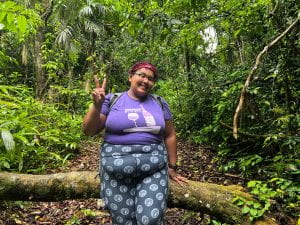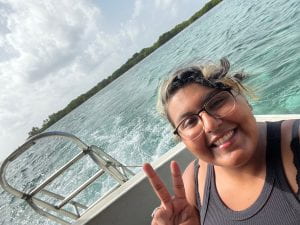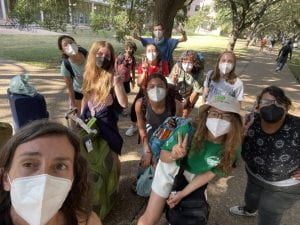I can’t believe that the trip is over. Each day lasted forever, but all together time flew by in the blink of an eye. There is no way to completely sum up my experiences into just a few paragraphs, especially since this trip was so full of firsts, but the least I can do is answer the questions asked of me. The rest is… kind of intangible, swirled up in my brain like the keystone memory that it is going to become, and no blog could do it justice.
The similarities between the reef (the rainforest of the sea) and the rainforest (the reef of the land) cannot be overlooked. Both ecosystems were so chocked full of diversity, each holding the title of the world’s majority stakeholders in biodiversity for their respective realms, there is no shortage of comparisons to be made.
First, they are not separate in the first place. The calcium carbonate from the reefs finds itself in the soils of the rainforest, and the sediments of the rainforest find themselves in the reef. Without one or the other, neither would be as we know it. The soils of the rainforest are homes to millions of creatures and critters, and provide a space for the brilliant, expansive fauna to grow. Nutrients in both of these ecosystems are hot commodities, snatched up at first notice, leaving the reefs and trees to find a way to get the nutrients they need. And so, both have figured out ways to maneuver through this system, coral using symbioses, trees laterally growing buttress roots, epiphytes finding nutrients from debris in the canopy – they continue to thrive in the low nutrient areas. This means that they both have this huge amount of biodiversity in spite of the lacking nutrients.
There are also creatures in both ecosystems that fill very specific niches that in their own ways push the ecosystems forward. From the symbiosis of the symbiodinium and coral to the plants and mycorrhizae, they have found ways to thrive in these competitive, complex ecosystems.
I noticed that the impacts of climate change and human influence between the two protected areas, the Marine Protected Area and the forest preserve, seemed vastly different. I feel like forests are a lot more resilient than the reefs, able to withstand more stress without dying out, and able to bounce back with less resistance. There is simply so much diversity within the rainforest that when it is standing, one thing will fall and another will take its place. But on the reef, one thing falls, and it takes 5 things with it.
I have to say, my favorite part of the course was snorkeling (in general). I love swimming and the water was so clear and watching the schools of fish swim by was so cool, it was an amazing experience. My least favorite part of the course was the hiking of the bird tower trail – which comes as a surprise to no one. I was terrified the whole way up and down, but hey, I pushed through and made it to the top (and back to the bottom).
One thing that I found so surprising was the state of the coral reefs, even within the marine protected area. They were mottled with disease, and often parts were just broken to rubble. I knew that reefs have been getting hit hard in the past century with a bunch of stressors, but it was crazy to see that in person, and that will definitely stick with me.
For my second thing, I never knew about lionfish and their prevalence as an invasive species – they were never even on my radar. Seeing Scott spear those fish was awesome in and of itself, but going forward into the future, I am now so much more aware of their presence and the need to rid the seas of them.
My last important thing is less tangible, but definitely something that I will remember in 5 years, or more honestly, for the rest of my life. That being the trip as a whole. Going on a field expedition to Belize, to the reef and the rainforest, as a scientist and researcher, meeting other POC scientists and researchers, being able to be immersed in the field, is something that I honestly probably would have never experienced if it weren’t for this trip. It showed me that I was capable of something to that level, to propose questions and make observations in a foreign place, and get taken seriously even as a student. This was only my second time out of the country, both of which occurred this summer – as an FGLI student, that alone had a learning curve. I will be forever grateful for the opportunity that this class allowed me to explore the field of biology and my own capabilities as a scientist, and that is certainly something that I can never forget.
This course exceeded my expectations, brought me to another side of the world and took me out of my comfort zone in ways that showed me what I was capable of. Even though we had to wrap up early, I wouldn’t change anything about this trip for the world (except maybe the amount of bug bites I received – I am still so itchy!!)



